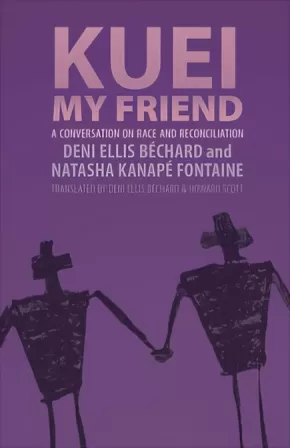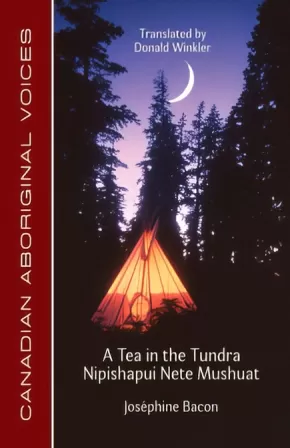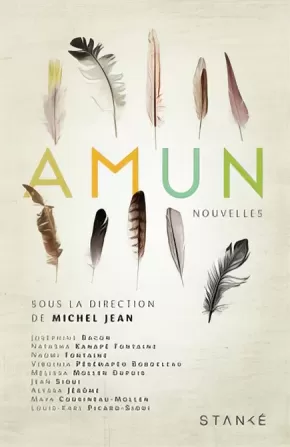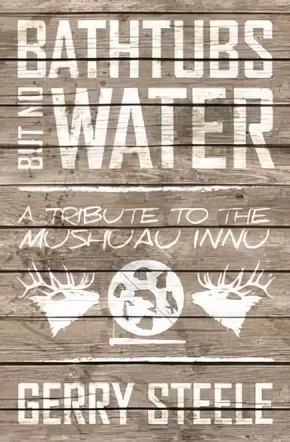Innu (Montagnais-Naskapi)
Synopsis:
Kuei, My Friend is an engaging book of letters: a literary and political encounter between Innu poet Natasha Kanapé Fontaine and Québécois-American novelist Deni Ellis Béchard. Choosing the epistolary form, they decided to engage together in a frank conversation about racism and reconciliation.
Intentionally positioned within the contexts of the Idle No More movement, Canada’s Truth and Reconciliation Commission, and the National Inquiry into Missing or Murdered Aboriginal Women and Girls, the letters in Kuei, My Friend pose questions in a reciprocal manner: how can we coexist if our common history involves collective and personal episodes of shame, injury, and anger? how can we counteract misunderstandings of the Other, which so often lead to contempt and rejection? how can we educate non-Indigenous communities about the impact of cultural genocide on the First Peoples and the invisible privileges resulting from historical modes of domination?
In an attempt to open a sincere and productive dialogue, Kanapé Fontaine and Ellis Béchard use their personal stories to understand words and behaviours that are racist or that result from racism. With the affection and intimacy of a friend writing to a friend, Natasha recounts to her addressee her discovery of the residential schools, her obsession with the Oka Crisis of 1990, and her life on the Pessamit reserve. Reciprocating, Deni talks about his father’s racism, the segregation of African-Americans and civil rights, and his identity as a Québécois living in the English-speaking world.
By sharing honestly even their most painful memories, these two writers offer an accessible, humanist book on the social bridge-building and respect for difference. Kuei, My Friend is accompanied by a chronology of events, a glossary of relevant terms in the Innu language, and, most importantly, a detailed teacher’s guide that includes topics of discussion, questions, and suggested reflections for examination in a classroom setting.
Educator Information
Recommended resource for Grades 10-12 in these areas: BC First Peoples, Contemporary Indigenous Studies, English First Peoples, English Studies, Literary Studies.
Includes an Innu-aimun glossary and a teacher's guide to help classroom discussion facilitation.
Recommended in the Canadian Indigenous Books for Schools 2019-2020 resource list as being useful for grades 10 to 12 for English Language Arts and Social Studies.
This resource is also available in French: Kuei, je te salue: Conversation sur le racisme.
Additional Information
176 pages | 6.21" x 8.46" | Translated by & Deni Ellis Béchard & Howard Scott
Synopsis:
In this bilingual English-Innu poetry collection, Joséphine Bacon challenges our traditional notions of culture and perception, landscape and wilderness, the limits of experience, and the nature of human being. With a surreal blend of emotions and memories, A Tea in the Tundra / Nipishapui Nete Mushuat portrays a complex and ever-shifting landscape of possibilities. The author passionately reveals a finely wrought sensibility, which elevates the subtle scenery of life's everyday events.
Educator & Series Information
This book is part of the Canadian Aboriginal Voices series.
Additional Information
96 pages | 5.50" x 8.50" | Translated by Donald Winkler
Synopsis:
Dans la langue innue, amun signifie « rassemblement ». Sous la direction de Michel Jean, écrivain et journaliste innu, ce collectif réunit pour la toute première fois des auteurs autochtones de divers horizons, de différentes nations et générations. Leurs textes de fiction reflètent tantôt l'histoire et les traditions, tantôt la réalité des Premières Nations au Québec et au Canada. Offrant à lire les points de vue d'artistes de renom, ce livre est le théâtre d'un rassemblement et d'une prise de parole qui ne se font que trop rarement.
Avec des nouvelles inédites de Joséphine Bacon, Natasha Kanapé Fontaine, Naomi Fontaine, Virginia Pésémapéo Bordeleau, Melissa Mollen Dupuis, Jean Sioui, Alyssa Jérôme, Maya Cousineau-Mollen, Louis-Karl Picard-Sioui et Michel Jean.
Additional Information
168 Pages | Paperback
Synopsis:
In 1967, the Mushuau Innu — the Aboriginal people of Labrador — were resettled on Davis Inlet by the Canadian government. Originally a land-based people, this move to the coast created cultural, economic and spiritual upheaval, and Davis Inlet became synonymous with shocking substance abuse and suicide rates. In Bathtubs but No Water, Gerry Steele offers the reader a participant observer’s perspective on Davis Inlet. An employee of the federal government working with the Mushuau Innu since 1993, Steele explores their oral history of the resettlement process, substance abuse and deaths, and argues that these problems are a direct result of the government’s lack of respect for Aboriginal peoples. In 1992, the Innu tried to regain responsibility for their future, focusing on the traditions and strengths of their own community, but government bureaucracy would not support this partnership. Steele urges the government to engage in respectful partnerships with Aboriginal communities in order to achieve positive change.
Additional Information
|










